
Economic and Environmental Geology
Scope & Guideline
Navigating the Complexities of Earth's Resources Responsibly
Introduction
Aims and Scopes
- Geochemical and Mineralogical Studies:
Research in this area covers the chemical composition and behavior of minerals and elements in both natural and anthropogenic environments, exploring their implications for environmental health and resource management. - Environmental Impact Assessments:
This scope includes studies that evaluate the effects of geological activities and resource extraction on the environment, focusing on pollution, land degradation, and ecosystem health. - Resource Management and Utilization:
Research on the sustainable management and utilization of geological resources, including aggregates, minerals, and water resources, is a key focus, promoting strategies for efficient and responsible usage. - Geological Hazards and Risk Assessment:
Investigations into geological hazards, including earthquakes, landslides, and other natural disasters, are crucial for understanding risks and developing mitigation strategies. - Technological Applications in Geoscience:
The journal encourages studies that apply advanced technologies, including machine learning and geospatial analysis, to improve understanding and management of geological and environmental data.
Trending and Emerging
- Impact of Climate Change on Geological Resources:
Recent studies are increasingly focusing on how climate change affects geological resources and processes, highlighting the need for adaptive strategies in resource management. - Pollution and Contaminant Studies:
There is a growing emphasis on understanding the behavior and impact of pollutants, particularly heavy metals and radionuclides, in various environments, which is crucial for environmental remediation efforts. - Sustainable Practices in Resource Management:
Research aimed at developing sustainable practices for the extraction and use of geological resources is trending, reflecting a broader societal shift towards sustainability. - Technological Innovations in Geosciences:
The application of advanced technologies, such as machine learning and geospatial analysis, is becoming more prevalent, enhancing the ability to analyze complex geological and environmental data. - Interdisciplinary Approaches to Environmental Challenges:
Emerging themes show a trend towards integrating geoscience with environmental policy, economics, and social sciences, addressing complex global challenges collaboratively.
Declining or Waning
- Traditional Resource Extraction Studies:
Research centered around conventional extraction methods of geological resources, such as coal and metals, is observed to be waning as the focus shifts towards more sustainable and innovative practices. - Historical Geological Studies:
Papers that primarily focus on historical geological formations and their characteristics are becoming less frequent, possibly due to a growing emphasis on contemporary issues and applications. - Basic Geological Mapping and Descriptions:
While foundational geological mapping is essential, studies that offer only basic geological descriptions without addressing contemporary challenges or applications are seeing reduced publication frequency.
Similar Journals
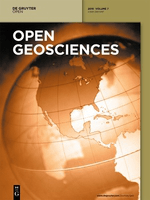
Open Geosciences
Innovating Discussions in Environmental Science.Open Geosciences, published by DE GRUYTER POLAND SP Z O O, is a prominent open access journal that has been serving the scientific community since its inception in 2015. With an ISSN of 2391-5447, this journal focuses on the dynamic fields of Earth and Planetary Sciences as well as Environmental Science, securing a commendable Q2 ranking in both categories as of 2023. Situated in Germany, Open Geosciences is committed to disseminating high-quality research and facilitating innovative discussions surrounding geosciences. The journal embraces a diverse range of topics, aiming to foster collaboration among researchers, professionals, and students worldwide. As an open access publication, it enhances visibility and accessibility of its articles, allowing for greater engagement within the global scientific community. This is further substantiated by its respectable Scopus rankings—77th out of 195 in General Earth and Planetary Sciences and 97th out of 219 in Environmental Science—which underscore its significance in advancing geoscientific knowledge. Whether you are a researcher looking to publish your findings or a student seeking valuable insights, Open Geosciences stands out as a crucial resource in the exploration of our planet and its environment.
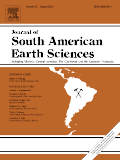
JOURNAL OF SOUTH AMERICAN EARTH SCIENCES
Fostering Insights into Earth's Dynamic ProcessesJOURNAL OF SOUTH AMERICAN EARTH SCIENCES is a premier interdisciplinary journal dedicated to publishing high-quality research in the fields of Earth-Surface Processes, Geology, and Paleontology, making it an essential resource for scientists and researchers focused on South American geology and its diverse geological phenomena. Published by Pergamon-Elsevier Science Ltd in the United Kingdom, this journal has been instrumental in disseminating groundbreaking studies since 1988, showcasing contributions that push the boundaries of knowledge in Earth and Planetary Sciences. With an impressive Scopus ranking—positioning it in the 74th percentile for Paleontology and 71st for Geology—this journal not only reflects robust academic quality but also its commitment to addressing critical geological challenges in South America. Researchers will appreciate its objective of advancing understanding of geological processes while providing insights into past, present, and future Earth environments. Although available through traditional subscription models, the journal's vast repository of articles enriches the academic landscape, facilitating the sharing of vital research among professionals, students, and geological practitioners.
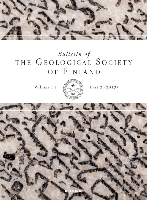
BULLETIN OF THE GEOLOGICAL SOCIETY OF FINLAND
Cultivating a vibrant community of geological scholars.BULLETIN OF THE GEOLOGICAL SOCIETY OF FINLAND, a distinguished publication in the field of Geology, has been at the forefront of scientific discourse since its inception. Published by the Geological Society of Finland, this journal offers an Open Access platform for researchers since 1968, ensuring that high-quality geological research is widely accessible. With an ISSN of 0367-5211 and E-ISSN 1799-4632, the journal aims to disseminate significant findings in Earth and planetary sciences, contributing to a richer understanding of geological phenomena. Situated in Finland and headquartered at the Finnish Museum of Natural History, University of Helsinki, it serves as a pivotal resource for professionals, students, and researchers, maintaining a respectable Q3 category rank in Geology as of 2023 within Scopus' metrics. The journal is committed to fostering the advancement of geology through rigorous peer-reviewed articles, innovative research methodologies, and interdisciplinary approaches, helping to bridge gaps in knowledge while inspiring new generations of geoscientists.

Journal of Himalayan Earth Sciences
Exploring the Earth's Mysteries of the HimalayasThe Journal of Himalayan Earth Sciences (ISSN: 1994-3237; E-ISSN: 2305-6959) is a distinguished publication by UNIV PESHAWAR, dedicated to advancing knowledge in the field of earth sciences, particularly as they relate to the Himalayan region. Established in 2013, this journal aims to provide a platform for researchers, professionals, and students to share original research findings, reviews, and innovative methodologies that contribute to the understanding of geological and environmental phenomena in this ecologically significant area. Despite being categorized in Q4 of the Earth and Planetary Sciences, the journal showcases valuable contributions to the scientific community and encourages submissions that delve into both the challenges and advancements within Earth sciences, with a particular focus on the unique geological structures and processes of the Himalayas. As an open-access journal, it ensures that research is accessible to a global readership, promoting collaboration and discussion among scholars and practitioners. The journal's operational base in Peshawar, Pakistan, places it at the heart of Himalayan research, making it an invaluable resource for those invested in earth sciences.

Turkiye Jeoloji Bulteni-Geological Bulletin of Turkey
Connecting innovative geological theories with real-world applications.Turkiye Jeoloji Bulteni-Geological Bulletin of Turkey (ISSN: 1016-9164) is a prominent scholarly journal published by the TMMOB JEOLOJI MUHENDISLERI ODASI in Türkiye, dedicated to advancing the field of geology through high-quality research and dissemination of significant scientific findings. With an emphasis on geological studies pertinent to the region and its global implications, the journal serves as a crucial platform for researchers, professionals, and students aiming to share and explore innovative theories, methodologies, and case studies. Although the journal operates under a traditional access model, its rich content provides valuable insights into varied topics including but not limited to mineralogy, geophysics, petrology, and environmental geology. Furthermore, the journal's commitment to exhibiting originality and relevance ensures its vital role in shaping geological research, fostering collaboration among academics and practitioners alike.
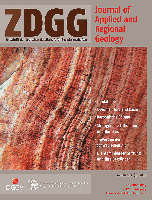
Zeitschrift der Deutschen Gesellschaft fur Geowissenschaften
Exploring Geological Frontiers: Your Gateway to Earth ResearchZeitschrift der Deutschen Gesellschaft für Geowissenschaften is a prominent academic journal published by E Schweizerbart’sche Verlagsbuchhandlung, dedicated to advancing research in the field of Earth and Planetary Sciences. With its ISSN 1860-1804 and E-ISSN 1861-4094, this journal provides a platform for researchers to disseminate high-quality scientific articles and insights that contribute to our understanding of geological and environmental phenomena. Over the years, it has established itself as a reputable source within its category, holding a Q3 ranking among the Earth and Planetary Sciences (miscellaneous) journals in 2023, and achieving an impressive 85/195 rank in Scopus, placing it in the 56th percentile. The journal is published from Germany, specifically at Johannesstraße 3A, D 70176 Stuttgart, where it fosters a collaborative environment for scholars, professionals, and students alike. Although currently not an Open Access journal, it offers critical insights into various geoscience topics, making it an essential resource for those engaged in geological research and education. With its converged years stretching from 2008 to 2024, Zeitschrift der Deutschen Gesellschaft für Geowissenschaften is poised to continue its impactful role in the geosciences community.

Bulletin of the Mineral Research and Exploration
Exploring the Depths of Geological InnovationBulletin of the Mineral Research and Exploration, published by MADEN TETKIK VE ARAMA GENEL MUDURLUGU-MTA in Turkey, is a prominent open-access journal that has been disseminating vital research in the fields of geology and geotechnical engineering since 1936. With an ISSN of 0026-4563 and a commitment to sharing knowledge without barriers, this journal fosters an inclusive environment for researchers, professionals, and students alike. The journal is recognized for its contribution to the scientific community, illustrated by its Q3 ranking in Geology and Q4 ranking in Geotechnical Engineering and Engineering Geology for the year 2023. Despite its solid performance, the journal remains dedicated to improving its Scopus rankings, currently positioned at #230 out of 321 in Earth and Planetary Sciences for Geology, and #169 out of 229 in Geotechnical Engineering. The journal's historical convergence of years emphasizes its longstanding relevance and adaptability in disseminating cutting-edge research. By offering open access, it ensures that vital geological and engineering insights are readily available to a global audience, thereby enhancing collaboration and advancing knowledge in these crucial fields.
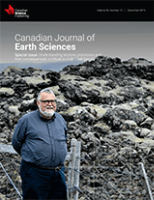
CANADIAN JOURNAL OF EARTH SCIENCES
Championing Quality Research in GeosciencesCanadian Journal of Earth Sciences, published by Canadian Science Publishing, serves as a leading platform for the dissemination of cutting-edge research in the field of Earth and Planetary Sciences. Since its inception in 1968, the journal has contributed significantly to the advancement of knowledge through its rigorous peer-reviewed articles and has established itself within the Q2 category in Earth and Planetary Sciences, reflecting its strong academic reputation and research impact. With an impactful ranking of #87 out of 195 in Scopus, it is positioned within the 55th percentile, showcasing its relevance and quality in the scientific community. The journal caters to a diverse readership ranging from seasoned researchers to emerging scholars, providing vital insights into geoscience disciplines and fostering discussions on significant environmental issues. While it is not an open-access publication, the Canadian Journal of Earth Sciences remains committed to accessible research, ensuring that high-quality findings are shared widely within the Canadian and global scientific communities.
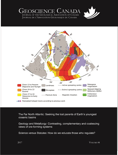
GEOSCIENCE CANADA
Pioneering Research for a Sustainable PlanetGEOSCIENCE CANADA is a premier academic journal published by the Geological Association of Canada, dedicated to advancing knowledge and research in the field of Earth and Planetary Sciences. With an ISSN of 0315-0941 and an E-ISSN of 1911-4850, this journal has been a key platform for scholarly discourse since its inception in 1979, continuing its valuable contributions through to 2024. Positioned in the Q2 quartile for Earth and Planetary Sciences (miscellaneous) as per the 2023 rankings, GEOSCIENCE CANADA is recognized for its rigorous peer-review process and impactful publications, making it a vital resource for researchers, professionals, and students alike. The journal covers a broad array of topics within geoscience, promoting innovative research and discussions pertinent to geologists and Earth scientists across Canada and internationally. While it does not currently provide open access options, the journal continues to support a diverse readership eager to engage with cutting-edge studies that shape the understanding of Earth's processes.
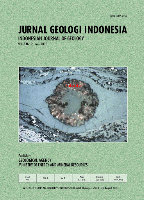
Indonesian Journal of Geoscience
Innovating Earth Sciences: Bridging Knowledge and Community.Indonesian Journal of Geoscience, published by the GEOLOGICAL AGENCY, is a vital platform for sharing cutting-edge research in the field of Earth and Planetary Sciences. With an ISSN of 2355-9314 and E-ISSN of 2355-9306, this open-access journal has been making significant contributions to the geoscientific community since its establishment in 2013. Operating out of Bandung, Indonesia, the journal is dedicated to disseminating high-quality research across diverse areas, making it an essential resource for researchers, professionals, and students alike. Recognized in the 2023 Q2 category in Earth and Planetary Sciences, it currently ranks #134/195 among general Earth and Planetary Sciences journals in Scopus, reflecting its growing prominence and academic rigor. The journal seeks to foster scientific discussions by publishing original research, reviews, and case studies that address contemporary challenges and advancements in geoscience, thus contributing to a deeper understanding of our planet. With its commitment to open access, the Indonesian Journal of Geoscience ensures that vital research is accessible to a global audience, encouraging collaboration and innovation in the field.